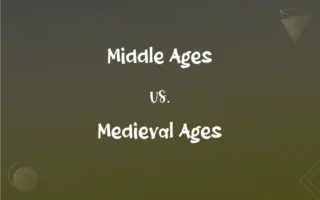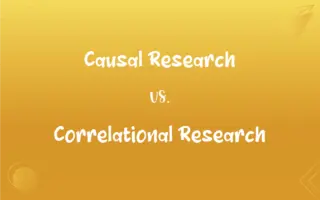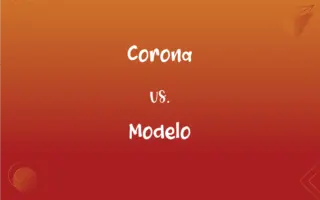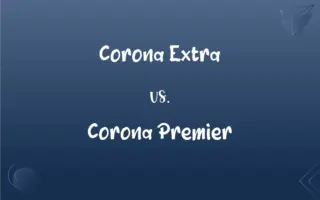Common Law vs. Constitutional Law: What's the Difference?
Edited by Aimie Carlson || By Harlon Moss || Published on January 27, 2024
Common law is based on judicial decisions and precedent, whereas constitutional law is derived from a country's constitution, outlining government powers and individual rights.
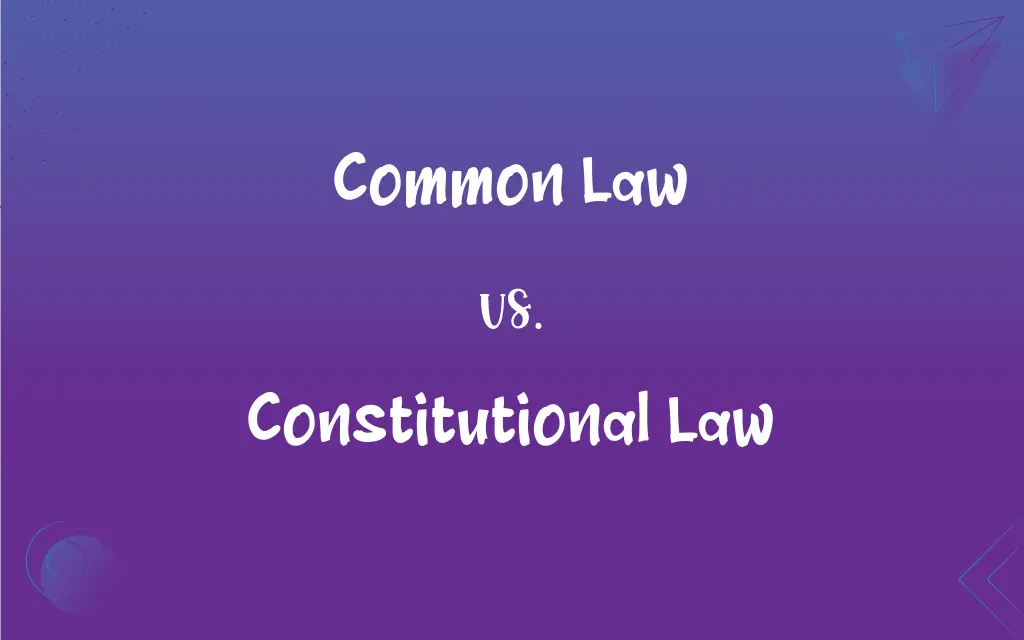
Key Differences
Common law evolves from court decisions over time, forming a body of precedents that guide future rulings. Constitutional law, however, is founded on a written constitution, setting out the framework and principles of a state’s governance.
In common law, judges interpret and apply laws based on previous case decisions, creating a dynamic and adaptable legal system. Constitutional law primarily involves interpreting and applying the nation's constitution, focusing on the distribution of power and fundamental rights.
Common law is characterized by its flexibility and ability to evolve with societal changes. In contrast, constitutional law tends to be more static, with changes usually occurring through formal amendments or significant judicial interpretation.
The scope of common law includes a wide range of areas, such as property, contracts, and torts. Constitutional law deals specifically with issues related to constitutional interpretation, rights, and government structure.
Common law can vary significantly between jurisdictions, reflecting the unique historical and societal contexts. Constitutional law is unique to each country and reflects its specific political and cultural values.
ADVERTISEMENT
Comparison Chart
Source
Judicial decisions and precedents.
The nation's written constitution.
Focus
Case law and legal interpretations.
Government structure and individual rights.
Flexibility
More adaptable to societal changes.
More static, changes through amendments.
Scope
Broad, covering various legal areas.
Focused on constitutional issues.
Variability Between Jurisdictions
Varies widely between jurisdictions.
Unique to each country’s constitution.
ADVERTISEMENT
Common Law and Constitutional Law Definitions
Common Law
Common law evolves through the decisions made in courts.
Common law has shaped the principles of contract law over centuries.
Constitutional Law
Constitutional law involves the relationship between different branches of government.
The case tested the limits of executive power under constitutional law.
Common Law
Common law is unwritten law formed by judicial decisions.
Property rights in common law are based on court rulings.
Constitutional Law
Constitutional law can lead to amendments to the constitution.
This constitutional law debate might result in a constitutional amendment.
Common Law
Common law allows judges to be law-makers through their rulings.
In common law, a judge's ruling can set a new legal precedent.
Constitutional Law
Constitutional law outlines the structure of government and individual rights.
Constitutional law protects the fundamental rights of citizens.
Common Law
Common law is characterized by the doctrine of precedent.
Common law ensures consistency in legal decisions over time.
Constitutional Law
Constitutional law governs the interpretation and implementation of the constitution.
The Supreme Court decision was a significant moment in constitutional law.
Common Law
Common law is a legal system based on judicial decisions and precedent.
The judge referred to common law in making her ruling.
Constitutional Law
Constitutional law is the body of law dealing with the principles set out in the constitution.
Constitutional law addresses issues like separation of powers.
Common Law
Of, relating to, or based on common law.
Common Law
Of or relating to a common-law marriage.
Common Law
Of or pertaining to common law.
Common Law
Relating to common-law marriage.
Common Law
Based on common law;
A common-law right
FAQs
What is common law?
A legal system based on judicial decisions and precedent.
How does common law develop?
Through the accumulation of court decisions over time.
Can common law change?
Yes, it evolves with new court decisions and societal changes.
Can constitutional law be challenged?
Yes, through legal processes and court challenges.
What does constitutional law focus on?
The structure of government and protection of individual rights.
How are constitutional amendments made?
Through a formal process outlined in the constitution itself.
Are constitutional laws the same in every country?
No, they are specific to each country's constitution.
What is a precedent in common law?
A principle established in a previous legal case used as a reference.
Does common law exist in all countries?
No, it's specific to certain legal systems, like the UK and the US.
What is judicial review in constitutional law?
The power of courts to declare laws unconstitutional.
What is constitutional law?
Law that interprets and applies a country's constitution.
Does common law override statutory law?
No, statutory law typically takes precedence.
Are rights in constitutional law absolute?
No, they can be subject to limitations for public interest.
What is the significance of a constitution?
It's the supreme law outlining government powers and rights.
How does constitutional law affect citizens?
It determines their rights and relationship with the government.
Is constitutional law subject to interpretation?
Yes, it often requires interpretation by courts.
Can common law be written down?
While based on court rulings, it can be documented in legal texts.
What role do judges play in common law?
Judges interpret and create law through their rulings.
How is common law used in courts?
As a guide for deciding similar legal cases.
Can common law principles vary between regions?
Yes, they can differ based on local court decisions.
About Author
Written by
Harlon MossHarlon is a seasoned quality moderator and accomplished content writer for Difference Wiki. An alumnus of the prestigious University of California, he earned his degree in Computer Science. Leveraging his academic background, Harlon brings a meticulous and informed perspective to his work, ensuring content accuracy and excellence.
Edited by
Aimie CarlsonAimie Carlson, holding a master's degree in English literature, is a fervent English language enthusiast. She lends her writing talents to Difference Wiki, a prominent website that specializes in comparisons, offering readers insightful analyses that both captivate and inform.

